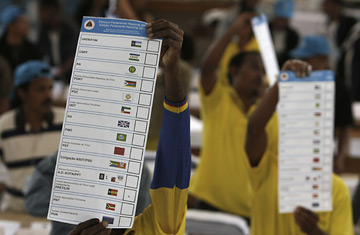
Election workers show ballot papers during the East Timorese elections
Democracy can be a messy business. The tiny Southeast Asian nation of East Timor, just five years old, learned that lesson this week after parliamentary elections on Saturday resulted in no one party capturing a majority. Preliminary official results released on July 5th gave former ruling party Fretilin 29% of the vote, while the National Congress for the Reconstruction of East Timor (CNRT), the party newly formed by popular ex-President and independence fighter Xanana Gusmão, trailed with 24%. The split vote means that East Timor — already fractured along geographical and socioeconomic lines — will most likely be ruled by a coalition government composed of squabbling members. "We will try to find agreement," says Fernando de Araujo, whose Democratic party may be a member of the piecemeal government. "But we have some big differences, and there is little trust [between parties].
The nation of East Timor was born in bloodshed. Hundreds of civilians died in 1999 as departing soldiers from Indonesia, which ruled the half-island for 24 years, torched the country. The United Nations quickly moved in, restored peace and set about providing this traumatized country with the basics of nationhood, from a constitution to government ministries. By 2004, the UN administration was confident enough about East Timor's start-up democracy that it began pulling out troops.
But since then, this nation of 1 million has largely stagnated. Gang violence paralyzes the streets of capital Dili. Incomes haven't increased, while malnutrition is up. And citizens are still reeling from another paroxysm of violence that erupted last year after an army revolt went sour, resulting in dozens of deaths. Tens of thousands of people still live in refugee camps, too afraid to return home. U.N. peacekeepers again patrol the streets.
Many East Timorese blame Fretilin for their nation's woes. Back in 2001 when the first parliamentary elections were held, the party led by a posse of exiled resistance fighters captured 57% of the vote.
Support for Fretilin this time around was roughly half that amount, and the party is increasingly viewed as out of touch with East Timor's poverty-stricken masses. "In five years, Fretilin was not able to do anything to make this country better," says Lucia Lobato, a politician with the opposition Social Democratic Party. "People have lost patience."
Yet no other political force has been able to fully capitalize on Fretilin's waning popularity, not even Gusmão's CNRT. Although the party was founded by East Timor's most beloved leader, CNRT was formed so hastily earlier this year that it was not able to build the electoral infrastructure needed to convert respect for Gusmão into actual votes. Still, Gusmão could very well end up as the country's Prime Minister after coalition talks take place over the coming weeks.
His chances may be boosted by the fact that Nobel Peace Prize laureate José Ramos-Horta, a Gusmão ally, fended off the Fretilin candidate to assume the post of President in May.
By contrast, the head of Fretilin, Mari Alkatiri, is nowhere near as popular as Gusmão. Indeed, Alkatiri had to resign as Prime Minister last year after his tenure was stained by his handling of the army rebellion. His resumption of the top post could trigger bloodletting on the streets. Yet on Wednesday Alkatiri struck a defiant tone, swearing that he will not allow his party to cooperate with CNRT.
Realistically, though, Fretilin will have to reach out to the No. 2 party if it wishes to be part of a governing bloc. No one said that democracy would be easy.
